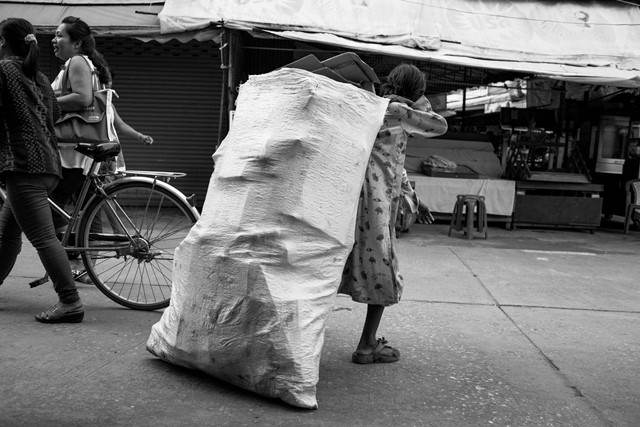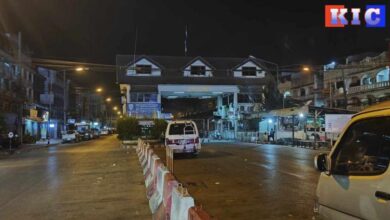World Day Against Child Labor: Child Workers, Exploited and Mostly Forgotten

To commemorate World Day Against Child Labour, Karen News spoke to child workers who scrape a meager living from collecting garbage in the Thai-Burma border town of Mae Sot. Too poor to go to school, they work unnoticed, working long days to help support their families. The children told Karen News of their hopes, dreams and daily concerns.
Hla Hla Htay, 12, drags a sack much larger than her small frame down one of Mae Sot’s back streets. The sack is filled with the town’s garbage – she and her family earn their living collecting it every day.
“I collect rubbish to help earn money for my family, there are eight people in my family.”
Hla Htay wants to go to school and join her friends, but says it is an impossible dream, as she needs to find money to support her family.
“I used to go to school…kindergarten, but now I can’t go to school because my parents can’t support me to go to school. We have to pay for electricity, water and house rent – 3000 baht a month. In the house there are three families. Each day I start working at 7, we work all day and finish around 9 [in the evening]. I collect rubbish for very little money, 40 baht (US$1.20 for a day’s work). I earn three baht for each kilo of cardboard I collect.”
Thailand’s minimum wage is 300 baht per day, but with steady streams of cheap labour flowing from poorer neighbouring countries like Burma, employers in Thailand often pay less.
Hla Htay says she, and the child garbage collectors, are often teased by other kids. “My friends can go to school. Sometimes they tease us garbage collectors and say that we are dirty, that our clothes are old. It hurts because it is true – we wear the same clothes for three days because we don’t have enough clothes. When people say these things, I want to cry because I can’t tell them anything in return. I am poor and they are rich so they feel like they can say whatever things to us they want.”
The National Health Commission Office of Thailand estimates that there are currently four million migrant workers in Thailand, with around half of them coming from Burma – A 2011 report by the Committee for Protection and Promotion of Child Rights in Burma (CPPCR) put the number of child migrant works in Thailand at 200,000 and noted that less than one third of these children have access to education.
A joint study by the United Nation’s Children’s Fund and the Asian Research Center For Migration, based in Chulalongkorn University, Bangkok, stated that Thai authorities left the children in a constant state of risk. “Migrant child workers are constantly at risk of being sexually exploited, assaulted and intimidated. Some of the children do not even receive a primary-level education because of their status as illegal migrants. Furthermore, whenever migrant children face problems, they cannot ask for protection from Thai officials or other government agencies. They are constantly at risk of arrest on the charge of illegal entry into Thailand.”
CCPCR, which aims to safeguard the welfare of migrant children in the Mae Sot area, confirmed to Karen News that as many as 30,000 migrant children lived in the Mae Sot area alone and added that nearly half – around 14,000 – do not attend school at all.
Ko Naing Min, the Director of CPPCR, said in an interview with Karen News that children not attending school were vulnerable to many types of abuse. “These children are more at risk of sexual abuses, exploitation, child labour and accidents,” he said.
Nay Yeh Lin,12, sits on a small brick wall near the Burmese market, and rubs his tired eyes.
“We work hard, and start at 7 everyday… sometimes, if I don’t get enough rubbish my mum gets angry and beats me. So I work [hard] each day. I can collect only 50 baht worth of garbage even with one big bag. I want to go to school, but without money it is not possible.”
For Nay Yeh Lin and his family, even renting a basic pedal driven cart is an unmanageable expense. “We don’t have a cart to transport the garbage because we would have to rent it from other people and this would cost 20 baht per day.”
Nay Lin spoke of his future. “One day I hope to become a carpenter and then I hope I can help my mum more.”
Thai law prohibits children under the age of 13 working and, since 2005, holds that all children should have access to education regardless of nationality, legal status or race. Thai law also noted that children between the ages of 13 to 15 may work but only under strict conditions including in the: “Messenger; commercial service job where liquor is prohibited; collection and selling of flowers, fruits, groceries, beverages without alcohol; and manual labor involving weights of no more than 10 kilograms.”
The UN Declaration of Human Rights notes that all children have a universal right to education. Thailand, as a member state of the UN is also obligated to protect the rights of the child which include: “the child to be protected from economic exploitation and from performing any work that is likely to be hazardous or to interfere with the child’s education, or to be harmful to the child’s health or physical, mental, spiritual, moral or social development.”
But for many young migrant children who have to work, like Nay Lin and Lah Htay, the UN Declaration of Human Rights is a remote concept.




